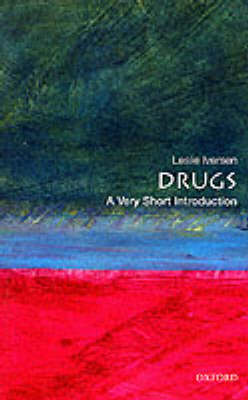By Kirsty McHugh, OUP UK
Last week it was announced by the British Home Secretary, Alan Johnson, that Professor Les Iversen had been appointed as the new chairman of the Advisory Council on the Misuse of Drugs (ACMD). This is the board that advises the UK government on drug issues. Professor Iversen was, until his retirement, at the Pharmacology Department at the University of Oxford. He is also the author of several books on drugs, including Drugs: A Very Short Introduction (2001). In the short excerpt from that book, below, Professor Iversen talks about the oldest of all recreational drugs: alcohol.
Alcohol is the oldest of all recreational drugs, and it is widely consumed in the Western world. The production of wines, beers, and distilled spirits is a very large industry, with worldwide sales of more than $300 billion. In most Western countries more than 80 per cent of the adult population will admit to having tried alcohol, and about 50 per cent are regular users. The consumption of alcohol continues to increase, and the range of alcoholic drinks is constantly widening – with, for example, sweet ‘alcopop’ drinks to attract the younger consumer – and in many countries alcoholic products are available twenty-four hours a day in supermarkets. The alcohol industry spends large amounts of money on advertising to encourage the sales of its products. The consumption of alcoholic drinks is deeply embedded in the culture of many countries: the special atmosphere of the traditional English pub or the German beer garden; the custom of drinking wine with the meal in France and Italy; the ice-cold aquavit of the Scandinavian cold table; and the universal champagne at the wedding reception.
 Exactly how alcohol acts in the brain to produce initially a state of excitement and intoxication and later sedation is not precisely understood. Scientists believe that the key actions of alcohol target the two principal chemical messenger systems in the neural circuits of the brain. Alcohol enhances the actions of the main off signal, GABA, and partially blocks the main on signal, L-glutamate. But there is more to it than that: the pleasurable intoxicant actions of alcohol seem to be due in part to its ability to stimulate opiate mechanisms in the brain – the same ones that are stimulated more directly and more aggressively by heroin. The drug naltrexone acts as an antagonist of the opiate receptors in the brain. It has been used successfully in treating heroin addicts, and more recently it has been shown to be effective in treating alcoholics. The drug removes the pleasurable effects of both heroin and alcohol, making it easier for the dependent user to quit.
Exactly how alcohol acts in the brain to produce initially a state of excitement and intoxication and later sedation is not precisely understood. Scientists believe that the key actions of alcohol target the two principal chemical messenger systems in the neural circuits of the brain. Alcohol enhances the actions of the main off signal, GABA, and partially blocks the main on signal, L-glutamate. But there is more to it than that: the pleasurable intoxicant actions of alcohol seem to be due in part to its ability to stimulate opiate mechanisms in the brain – the same ones that are stimulated more directly and more aggressively by heroin. The drug naltrexone acts as an antagonist of the opiate receptors in the brain. It has been used successfully in treating heroin addicts, and more recently it has been shown to be effective in treating alcoholics. The drug removes the pleasurable effects of both heroin and alcohol, making it easier for the dependent user to quit.
The majority of drinkers are able to indulge in alcohol without damaging themselves or others, and indeed a number of studies have shown that the consumption of moderate amounts of alcohol can reduce the risk of heart disease and stroke. But alcohol consumption also has a considerable down side. The acute stage of alcohol intoxication releases normal inhibitions and tends to promote reckless and often violent behaviour. Fights with broken bottles and beer glasses as weapons can interrupt the friendly atmosphere of the Engl


